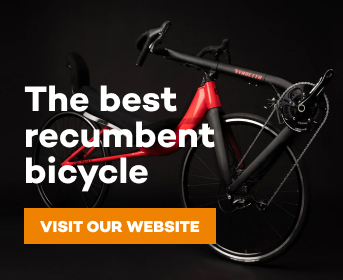John Tolhurst
Zen MBB Master
We've seen some great successes on the Vendetta which have thoroughly vindicated all the design premises of going to front wheel drive for recumbent bikes. Behind the scenes there are always manufacturing challenges such as how to obtain the right materials and what is the best way to design and construct the details. Some of those challenges have been addressed and in a couple of weeks I will be in Taiwan to examine the parts as they come of tube bending machines, hydroform shaping presses and CNC machining tools.
Generally the challenge is how to better fabricate what we know we need and a key part of that is the mainframe. A quick look at the Vendetta shows that there is a downtube, low tube and seat tube, into which the seat shape is recessed. To achieve this requires a number of steps: tube sourcing, tube machining, jigging, welding, sending out again to have the seat shape cut by CNC, welding in the seat mounting surface, adding gussets, etc. So you can see its a bit tedious. We needed a better way to realise the whole mainframe. We decided to explore using hydroforming. Hydroforming is a method where the negative mold is made in a large 'sandwich' press. A donor tube is prepared by drawing (swaging) to manage wall thicknesses, then bending the tube into the approximate shape. The donor tube is then placed into the sandwich mold, the mold is closed, then each end is plugged and high pressure liquid is inserted, stretching the tube outwards until it comes into contact with the mold. When released, the tube now has the shape of the mold.
Hydroforming is used for many of the complex shapes in your motorcar, and is used for bicycle downtubes, when those downtubes have interesting, non-linear forms. Many might not know be familiar with hydroforming, but if you are even a casual observer of bicycle designs and I show you a hydroform tube it will be instantly familiar. I visited one of the largest hydroforming factories in Taiwan earlier this year and in principle we concluded it was possible to use this technology to create the Vendetta, but there were some issues to work through. HF tubes cannot turn sharp corners, there must be a minimum radius to any bends; and the total length of the tube was much longer than had been attempted by this factory before. Also, the total circumference of the tube cannot vary too much. But through many design interactions a tube was eventually defined that had the shape needed for the Vendetta, as well as requiring a donor tube that could be drawn successfully to give the right wall thicknesses.
We will evaluate in the coming weeks, and hope to be able to progress with (what appears will be) the world's first hydroform tube on a recumbent bicycle. The new design will transform the image of the Vendetta, and lend it and the whole notion of riding recumbents a new level of credibility within the bicycle world. Just one step on that journey, but I hope history will show it to be pivotal.
Generally the challenge is how to better fabricate what we know we need and a key part of that is the mainframe. A quick look at the Vendetta shows that there is a downtube, low tube and seat tube, into which the seat shape is recessed. To achieve this requires a number of steps: tube sourcing, tube machining, jigging, welding, sending out again to have the seat shape cut by CNC, welding in the seat mounting surface, adding gussets, etc. So you can see its a bit tedious. We needed a better way to realise the whole mainframe. We decided to explore using hydroforming. Hydroforming is a method where the negative mold is made in a large 'sandwich' press. A donor tube is prepared by drawing (swaging) to manage wall thicknesses, then bending the tube into the approximate shape. The donor tube is then placed into the sandwich mold, the mold is closed, then each end is plugged and high pressure liquid is inserted, stretching the tube outwards until it comes into contact with the mold. When released, the tube now has the shape of the mold.
Hydroforming is used for many of the complex shapes in your motorcar, and is used for bicycle downtubes, when those downtubes have interesting, non-linear forms. Many might not know be familiar with hydroforming, but if you are even a casual observer of bicycle designs and I show you a hydroform tube it will be instantly familiar. I visited one of the largest hydroforming factories in Taiwan earlier this year and in principle we concluded it was possible to use this technology to create the Vendetta, but there were some issues to work through. HF tubes cannot turn sharp corners, there must be a minimum radius to any bends; and the total length of the tube was much longer than had been attempted by this factory before. Also, the total circumference of the tube cannot vary too much. But through many design interactions a tube was eventually defined that had the shape needed for the Vendetta, as well as requiring a donor tube that could be drawn successfully to give the right wall thicknesses.
We will evaluate in the coming weeks, and hope to be able to progress with (what appears will be) the world's first hydroform tube on a recumbent bicycle. The new design will transform the image of the Vendetta, and lend it and the whole notion of riding recumbents a new level of credibility within the bicycle world. Just one step on that journey, but I hope history will show it to be pivotal.

.jpg width: 672px; height: 559px;)
.jpg height: 750px;)

